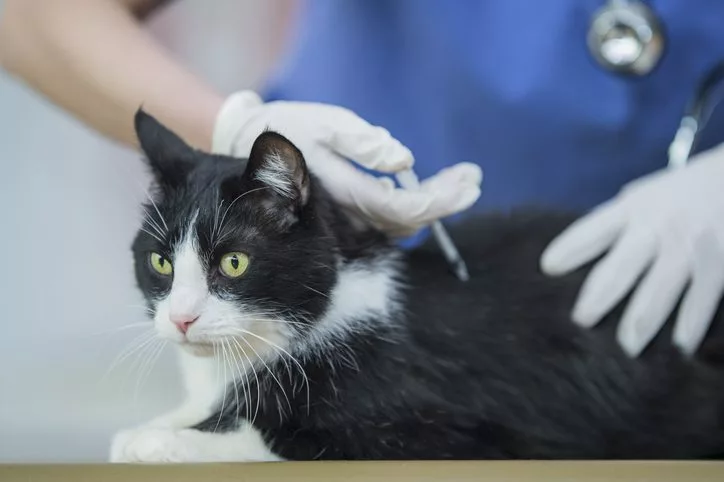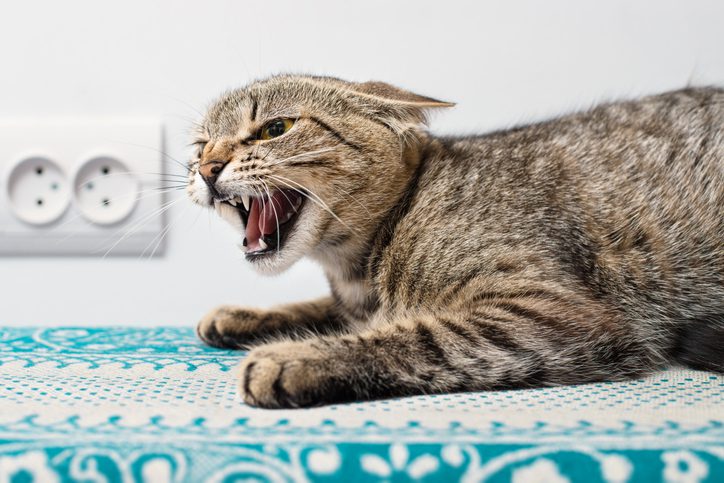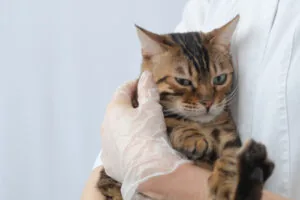Cat Rabies: Symptoms and What to Do in Dyer, IN

Rabies is a very serious matter, as it is the deadliest infectious disease in the world. Pet parents need to know the risks and consequences of not vaccinating their cats.
Some of the symptoms of rabies include violent or aggressive behavior, excessive saliva, and difficulty swallowing and blinking. If you suspect a wild animal has bitten your cat, you need to take them to the vet immediately for a booster shot.
Having your cat vaccinated in the first place is the best way to keep your fur baby, people, and other animals safe. Read this informative article if you want to know more about cat rabies symptoms and what to do.
What is Rabies?
Rabies is a fatal disease that typically occurs when a wild rabid or unvaccinated animal bites or scratches an animal. It is a zoonotic infection that can be passed between animals and people. Rabies is a progressive illness that impacts the central nervous system. Once symptoms are present, it usually results in death. Certain animals will sometimes carry rabies:
- Fox
- Coyote
- Raccoon
- Skunk
- Bat
The virus is shed in the infected animal’s saliva and then passed on to another animal through a bite. At the bite wound, the virus duplicates and then goes through the nerves to the brain. Most rabies in North America occurs in wild animals. Rabies vaccinations are required for pets, such as dogs and cats, so rabies is not often seen in our beloved pets.
What Are the Symptoms of Rabies in Cats?
The time between when a cat is first exposed and when they begin to show symptoms is called the incubation period. The average incubation period can be about 3 to 8 weeks; however, it could take as few as ten days or as long as one year. There are three stages of rabies in which the cat may display specific symptoms. These include the prodromal phase, furious phase, and paralytic phase:
Prodromal Phase
The prodromal phase is the earliest phase of rabies. It typically lasts for one or two days. The following symptoms are often present:
- Erratic behavior
- Mood changes
- Excessive saliva
- Loss of appetite
- Fly biting
- Itching in the wound area
You may also notice swollen, red eyes and light avoidance. Signs may differ depending on the cat.

Furious Phase
By the second or third day, the cat may demonstrate erratic behavior. There are also some other possible symptoms:
- Violent or aggressive behavior
- Irritability or rage
- Change in the sound of the cat’s voice
- Disorientation/seizures
- Eating or attacking unusual objects
- Twitching or tremors
At this point, the cat’s behavior can become unpredictable. They may also appear to be seeing things that are not there.
Paralytic Phase
This stage can occur after four days, making the cat unresponsive and depressed. There are some other symptoms associated with this phase:
- Protruding tongue and open mouth
- Weakness or severe lethargy
- Difficulty swallowing and blinking
- Progressive paralysis
- Coma
This stage is the final phase of rabies. Sadly, at this point, nothing can be done to save the cat.
What To Do if An Unvaccinated Animal Bites your Cat
Your vet should always look at any bite wounds. If you suspect that an animal with rabies has bitten your cat, you need to tell your veterinarian immediately. Your cat should receive a rabies vaccination, regardless of the last time they had a booster. Then, you keep them at home and keep a cautious eye on them.
The booster should increase protection against the virus. Unfortunately, if your cat has never been vaccinated, there is no way to prevent them from developing the symptoms of the virus. Your cat may be put in strict quarantine for six months to protect humans and other animals from becoming infected.
Unfortunately, animals who have contracted rabies are put down to prevent their suffering and avoid the illness’s spread. However, just because a strange animal bit your cat does not mean they have rabies. Therefore, it is essential for you to be aware of the symptoms in each stage and follow your veterinarian’s advice.
Healthy cats, dogs, and ferrets that have bitten a human and potentially caused the person to be exposed to rabies will be detained by the county health department and observed for ten days after exposure. If the pet is still healthy after ten days, they did not transmit rabies when they bit someone.
What Can Be Done to Prevent Rabies in Your Cat?
The good news is that even though rabies cannot be cured, it can be prevented. The disease is sporadic in the United States, where there are rigorous vaccination laws in each state for cats, dogs, and ferrets. Most states require you to have your kitten vaccinated between the age of 12 and 16 months with a booster shot a year later.
How often your cat is required to get a booster shot is determined by local laws. Usually, your vet will follow the directions of the vaccine manufacturer. There are two options: the one-year shot and the three-year shot. The rabies vaccine is tremendously effective at protecting cats against infection. There are some other tips to prevent rabies in your pets:
- Make sure your cat’s rabies vaccine is up to date
- If your kitty is too young to get the vaccine, keep them indoors unless they are supervised
- Keep your cat indoors at night. Please do not allow them to be outside past dusk
- Repair openings to your attic, garage, porch, or basement
- Cap your chimney with screens to prevent bats from flying into the house
You should also only feed pets indoors. It would be ideal to keep your cat indoors, especially if you live in areas where wildlife is prevalent.

Indoor Cats Should Also Be Vaccinated
Even indoor cats should be immunized against rabies to avoid the tragic consequences of remaining unvaccinated. Rabies is a worldwide endemic, and it is prudent to make sure that your cat receives their rabies vaccine and booster shots.
It protects your cat if they should happen to get outside somehow, and if they bite someone or if you are traveling with them overseas. Pets can be unpredictable, so they must be protected.
Conclusion
Make sure you have your cat vaccinated against rabies, which will protect them from the gruesome symptoms and, consequently, death. As the parent of your favorite pet, it is your responsibility to keep your cat safe.
Please give us a call at (219) 865-3737 to learn more about rabies or to schedule an appointment with us!
Share This Post
Recent Posts
About Dyer Animal Clinic
We are a place where pets and their people can feel at home. It's a place where wellness is maintained and supported from the time they’re newborns through their golden years.






